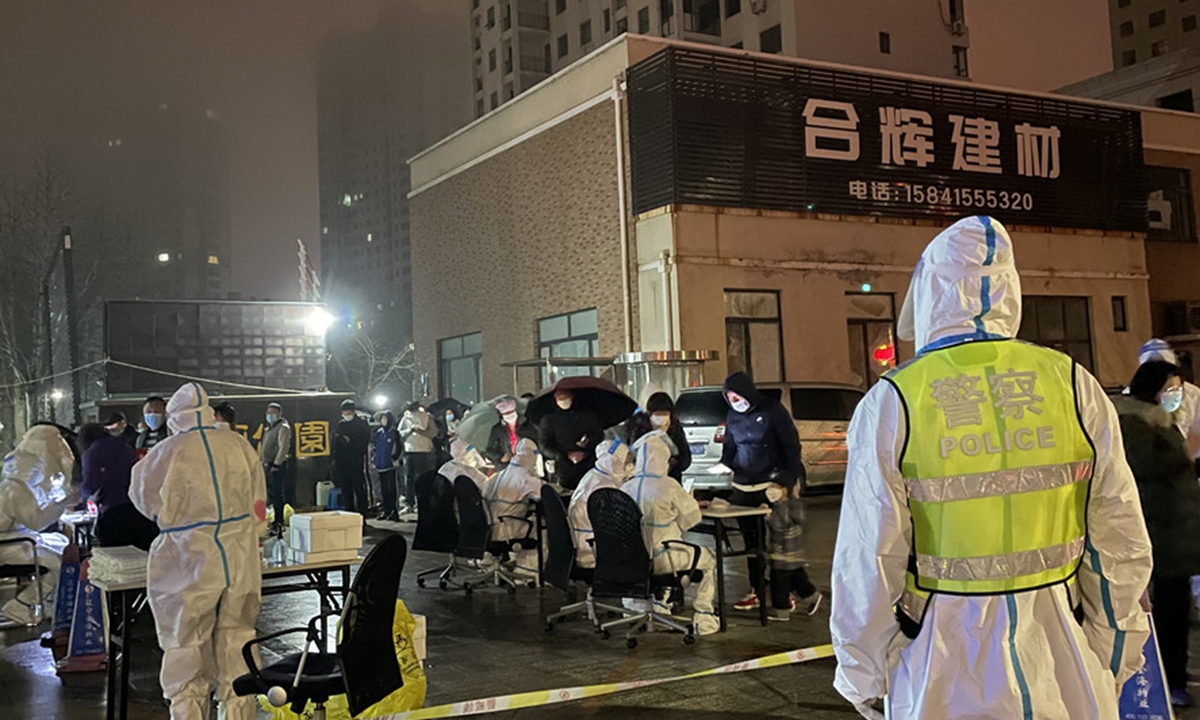Lesson from Dandong police-resident friction: let truth solve disputes: Global Times editorial

Residents take nucleic acid test of COVID-19 in Dandong, Liaoning Province. Photo: Xinhua
A continuing controversy in public opinion has been sparked as a woman and her father, with a yellow health code, were stopped and embroiled in a physical brawl with the police on their way to see a doctor in Dandong, a city in Northeast China's Liaoning Province. Local police have now issued a notification, which says the parties concerned have been dealt with accordingly. It is believed that the police notification has a legal basis, but this incident triggered a heated debate online, a reminder to the parties concerned to think about how to better balance emotions, reason and the law, so law enforcement can achieve the best social effect.Some details of this incident are not yet clear, and these are the key to the controversy. For example, the video circulating on the internet shows the woman said she had a certificate from her community giving her permission to go to the hospital and had taken a nucleic acid test the same day, so why did such a conflict occur? We should know that claims that "a resident taking her father to the doctor was stopped" can easily stir up controversy in public opinion, triggering questions about whether the practice of the police is too rigid and inhumane.
At the same time, there is another community certificate circulating on the internet showing that the woman is allowed to go to a designated hospital to pick up medicine. In another media report, the woman admitted that she had a 48-hour nucleic acid pass and a community certificate, but her father did not. This raised questions about whether the woman and her father were in compliance with relevant regulations, whether she went to a designated hospital, and whether the medical treatment was so urgently needed that it was necessary to break the rules.
After the incident, the notification from Dandong came quickly. It did not shy away from the public opinion focus, but the information authorities provided was not sufficient to quell the public opinion controversy. It is believed that more authoritative information can be provided to sort out right from wrong, the origin and development of the matter, and respond to public doubts with objective and complete facts in a realistic attitude. In this process, it is also necessary for the public to be patient, and especially to be vigilant against the tendency to pin any label on the case.
In any case, it is a pity this happened, because it did not have to become a trending topic in this way. The National Health Commission has clear guidelines on how to coordinate epidemic prevention and control and normal medical services, such as requiring localities to set up "yellow code hospitals" and so on. Dandong has its own "yellow code hospitals," and there are also very detailed regulations on how to transfer patients from areas under closed management or isolation venues. Given that many places have conducted such practices, it should not be a problem for "yellow code" personnel to seek medical treatment in accordance with relevant regulations, and physical conflicts between the police and the people can be avoided.
It is normal that frictions happen occasionally and it is not difficult to judge them according to law. However, on the premise of acting in line with laws and regulations, how to make law enforcement warmer and not cause complaints in solving grass-roots frictions while strictly abiding by regulations needs exploration and efforts by all places, and there should be no end to such exploration.
Only by promoting mutual understanding between different groups in society can conflicts be reduced from the beginning. As far as the Dandong case is concerned, if the father and daughter involved showed more respect and abided by the rules, if the police officer persuaded them in a more humane way, or provided more assistance to solve the problem on the premise of abiding by the rules, there might be a different result for this case.
According to the media report, the woman involved said she would obey the rules but would also make a complaint, while a staff member of the local police station responded that she could apply for a reconsideration of her case through the regular procedure. It is believed this incident will eventually be settled reasonably. At the same time, this case in Dandong should prompt us to reflect on how to make public services more convenient and how to conduct law enforcement more humanely, so the public will respect the law and obey the rules more, so the rules can be implemented better.
